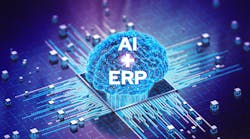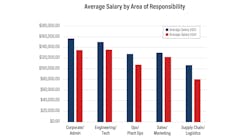Enterprise resource planning (ERP) systems are essential digital backbones that integrate key functions across manufacturing organizations. As artificial intelligence (AI) capabilities rapidly mature, ERP platforms are primed to undergo an AI-driven transformation. Integrating intelligent features promises to unlock new levels of connectivity, visibility, efficiency, and insight that can transform manufacturing industries.
Smarter Supply Chain Collaboration
For manufacturers, supply chain disruptions can rapidly spiral into lost revenue and compromised relationships with partners and customers. Expect the ERP systems in 2024 to provide real-time supply chain transparency through AI-enabled data sharing across organizations.
Rather than siloed databases, blockchain-based platforms will offer a "single version of the truth" to promote alignment. AI assistants can monitor this data and use natural language interfaces to update cross-functional teams. When shipments are delayed, or parts inventories shift, an AI-driven ERP can automatically adjust production schedules and purchasing orders across the supply network.
By collaborating through advanced ERP systems, trading partners can pivot quicker based on shared insights versus guesswork. Supply chains powered by collective AI will grow far more resilient against unexpected changes.
Predictive Planning and "Self-Healing" Operations
Historically, ERP forecasting capabilities relied heavily on human input, but AI algorithms get smarter over time as they process more and more data. In 2024, manufacturers can expect their ERP systems to become increasingly self-sufficient planning engines.
Based on analysis of historical patterns, demand forecasts, equipment logs, and external datasets around industry growth, weather, and more, ERP systems can continuously predict optimal production levels, asset utilization rates, inventory buffers, and other key planning factors. Some systems may eventually "self-heal" by automatically adjusting parameters to sustain KPIs if anomalies occur.
Rather than just producing static reports, predictive ERP systems will have a finger on the pulse of operations. The focus for manufacturing teams shifts from reactive damage control toward strategy, optimization, and innovation.
Explainable AI Promotes Adoption and Trust
As artificial intelligence further integrates into ERP and other business-critical systems, a parallel innovation known as explainable AI or XAI will gain relevance. Unlike black-box AI, whose inner workings are obscured, XAI solutions reveal the rationale behind AI's behavioral predictions, recommendations, and judgments. By understanding why decisions are made, issues around operational disruption, bias, safety, and integrity can be proactively prevented.
For manufacturers who hesitate before ceding too much control to AI, XAI builds confidence by supporting humans to validate machine outputs. As organizations implement intelligent quality control inspections, predictive maintenance programs, dynamic production scheduling and other 2024 workflow enhancements, XAI will accelerate adoption and sustained net benefit by maintaining stakeholder trust. Armed with insights into both AI judgments and the influencing variables that underpin them, manufacturers will wield the technology more reliably and responsibly.
The Rise of "No-Code Tools"
Historically, manufacturing organizations have relied on IT teams or external consultants to customize their ERP platforms. But in 2024 and beyond, AI-based will likely empower non-technical business users to build automated workflows, bots, reports, dashboards, and apps tailored to their needs.
Known as "citizen developers," factory supervisors, sales reps, HR coordinators, and finance heads will soon pinpoint inefficient processes and then rig automation solutions using drag-and-drop approaches instead of complex programming. This AI enables no code customizations that will unlock an army of ERP change agents who intimately understand workflows and can readily enhance them.
As organizations decentralize control of customization, ERP platforms will grow far more responsive to user needs on the frontlines versus the usual top-down edicts. Manufacturing teams gain the flexibility to adapt systems to their emerging pain points without dependencies.
The Interplay Between AI and Machine Learning
A common misconception is that artificial intelligence and machine learning are the same. Machine learning is a subset discipline within the broader AI field focused specifically on algorithms that can improve tasks through data exposure rather than explicit rule-based programming. As manufacturers adopt modern ERP platforms, capabilities that leverage both AI and its machine learning component will reshape operations.
AI delivers overarching abilities like natural language processing to enhance complex decisions and workflows. Machine learning acts as the end-use mechanics within those applications, evolving automation routines by incorporating new data. The interplay between the two - with AI setting direction and machine learning driving optimization - will accelerate as ERP systems get more intelligent. A clear understanding of their symbiotic relationship will help manufacturers extract maximum value.
The Path Towards Responsible AI Adoption
With great power comes great responsibility. As manufacturers race to embrace transformative technologies and ERP systems evolve with AI, ethical considerations around data transparency, algorithmic bias, privacy protection, and labor impacts demand attention to ensure healthy AI adoption.
Thankfully, leading technology standards bodies and policymakers are already developing more straightforward guidelines, rules, and guardrails so manufacturers can integrate AI safely, legally, and responsibly. New internal roles like Chief AI Ethics Officers are emerging to align new solutions with organizational values.
While regulatory pressures may slow a headlong rush into AI adoption, thoughtful foundations prevent negative impacts down the road. AI promises remarkable progress for manufacturers when harnessed judiciously, but its full potential requires cultivating human wisdom alongside technological prowess.
The ERP Revolution is Here
The manufacturing landscape in 2024 will look markedly different thanks to the AI enhancement of ERP and adjacent technologies. As cognitive capabilities elevate data-driven decision-making, human roles in operations will focus more on creativity, empathy, and complex problem-solving rather than tedious, repetitive manual efforts.
Manufacturers can leverage AI's emergence to achieve unprecedented resilience, agility, and performance with a smart strategy, strong leadership, courage to experiment, and a robust ERP system. The ERP revolution has arrived, and early adopters will reap sizable rewards. Are you ready to join them on the frontier of intelligent manufacturing? The future beckons.





